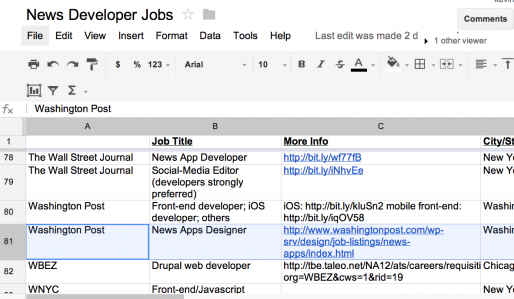This is one in a series of blog posts from the first ONA class of AP-Google Journalism and Technology Scholars describing their experiences, projects and sharing their knowledge with the ONA community. Katie Zhu is a junior at Northwestern University, working on LedeHub, a project for collaborative, open journalism.

When I tell people I’m studying both computer science and journalism, a frequent reaction is amazement that such a joint program exists.
Well, it doesn’t. In fact, the degree requirements for my two majors couldn’t be further apart. The respective buildings are even located at the polar opposite ends of campus. So I’ve been walking alone. Quite literally.
At the risk of sounding like I have a huge chip on my shoulder, let me say that there’s a pretty awesome niche of hyphenated types (programmer-journalist, designer-developer) who have been invaluable in getting me to where I am today and a big reason why I’m in this field. I’ve learned a lot from my peers. From extracurriculars. From internships. From my own side projects. But I’ve also experienced ample frustration in my choice of double majors.
And the frustrations aren’t with the lack of explicit courses that teach technical skills for doing journalism in the age of the interwebs (think data visualization, news application architecture, scraping, design principles and their implications for technical decisions). I’ve dug up my foundation for that elsewhere, and cherry-picked a few classes to supplement accordingly.
My frustrations are with the rigidity of my actual degree requirements – the credits I have to take in order to graduate. J-schools will only foster a true, technically integrated education when “double majoring” in both the engineering and journalism schools doesn’t mean shelling out another year’s worth of tuition or taking five or six credits a quarter to race to graduate on time.
I’m frustrated with the lack of a relevant and applicable journalism concentration that reflects the state of the news industry in 2013. How is it OK that journalism students are able to graduate without ever taking a real statistics or mathematics class, given the crazy demand for data journalists? Or without ever taking a programming class?
What we need are more journalism professors who can teach the valuable interdisciplinary skills for students looking to intern on say, news applications teams. We need professors who teach storytelling not just for the web, but of the web. Professors who will expose future journalists to the overlap of reporting and the fields of statistics, computer science and other technical disciplines. (We can even disguise it as “information science,” but that’s just a code word for “stats.”)
The field of journalism has always been interdisciplinary, traditionally through the non-technical disciplines – humanities, economics, political science. But times have changed, and the study of mathematics, statistics and computer science is ever more important to the emerging fields of data journalism, information graphics and news applications. That’s where the jobs are. That’s where the industry is heading (arguably, already there). That’s the new quality and standard to which we need to hold journalism. And that’s where education needs to step up its game.
What Would Help
What we need are more professors like this. Or this. And for those of you who just can’t wait to get started, I highly encourage you to enroll in Hacker Journalism 101.
